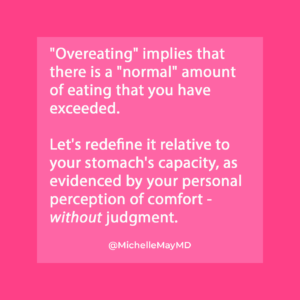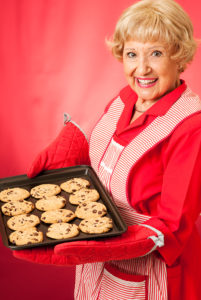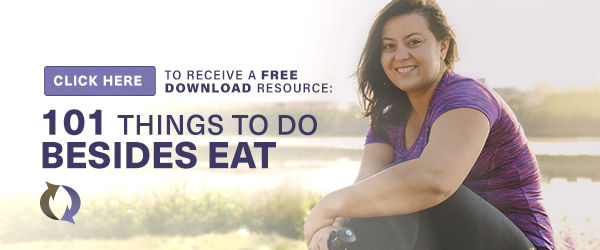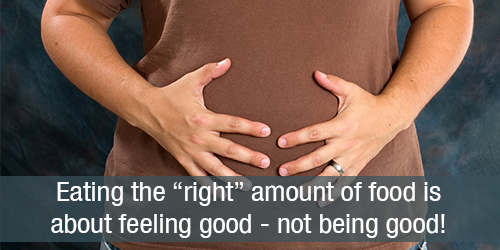Lately, the word “overeating” has been getting on my nerves! It occurred to me that “overeating” implies that there is a “normal” amount of eating you have exceeded. This short article is about why the word overeating is potentially problematic, some thoughts about what we really mean when we say overeating, and what we could say instead.
Over what eating?
During a mindful eating coaching session, my client said she had been overeating all week. I had a lot of questions to better understand her experience, including what does overeating mean to her?
Dictionary.com defines overeat as “to eat too much.” Too much in relation to what?
 For many people I work with, “overeating” typically has one of two meanings:
For many people I work with, “overeating” typically has one of two meanings:
- I ate more than (some predetermined portion size). This can take the form of going back for seconds, eating more than they feel they “should” have, eating more than the serving size on the package, eating more of a “bad” food than they think is allowed, and so on.
- I ate to the point of discomfort (or beyond).
Overeating defined by outside-in
The first meaning of overeating, eating more than a predetermined portion size, is an “outside-in” definition. You have exceeded the rules about what is permissible based on some externally measured standard.
It stems from our cultural obsessions with dieting. We are bombarded with messages about the “right” amount of food to eat. And for foods defined as “bad,” that amount is “as little as possible.”
One article said, “Overeating refers to eating more calories than your body uses for energy.” (For my more advanced readers only: To prove my point about how diet culture defines what overeating means, read that article and count how many restrictive messages you can find. I counted at least 18! Don’t read it if you’re not fully free of the eat-repent-repeat cycle because these messages can be very triggering.)
Clearly, that definition of overeating relative to the number of calories your body uses for energy is based on the threat of weight gain. Given our cultural obsession with thinness, it is no wonder that overeating is associated with guilt and shame!
(Which reminds me of another problematic word: Overweight! Over WHAT weight? But that is for another time…)
Redefine the answer to “what does overeating mean?”
 The meaning of “overeating” as eating to the point of discomfort is an inside-out definition, and one that is more in line with a non-restrictive, mindfulness-based, weight-neutral approach to eating.
The meaning of “overeating” as eating to the point of discomfort is an inside-out definition, and one that is more in line with a non-restrictive, mindfulness-based, weight-neutral approach to eating.
In this sense, “overeating” is eating an amount of food relative to your stomach’s capacity, as evidenced by your personal perception of comfort. It is not attached to judgment.
This is what we mean when we say “eating the ‘right’ amount of food isn’t about being good, it is about feeling good!”
Overeating is part of normal eating!
But let’s be clear: Eating to the point of discomfort is part of “normal” eating! Everyone does it from time to time.
The difference for people who don’t struggle with an “eat-repent-repeat” cycle is they don’t feel guilty, so they don’t continue eating because they are going back on their diet tomorrow.
They just feel full, so they wait to eat until they feel hungry again. They might regret their choice, but they don’t feel guilty, so there is nothing to repent.
 Some examples of times you might decide to eat past the point of comfort:
Some examples of times you might decide to eat past the point of comfort:
- When the food is particularly delicious.
- When you are unlikely to have that food again, for example when you are on vacation and enjoying regional specialties.
- When the social norm is to consume a lot of food, such as Thanksgiving or a Superbowl party.
- To please or appease someone who made something special for you (like Grandma’s apple pie or Tia’s tamales).
- When you are eating to celebrate a special occasion or soothe emotional discomfort. (YES! Emotional eating IS part of normal eating.)
- When you start eating before you’re hungry because it is convenient to eat then.
The key is “might decide“! Rather than eating on autopilot out of habit, make a conscious decision. Some considerations in your decision-making might include:
- Is this food so delicious it’s “worth” feeling uncomfortable afterward?
- Is it really true you can’t have that food again? Could you buy a souvenir cookbook or discover restaurants at home that specialize in that region?
- Is it necessary to eat to discomfort to enjoy the event?
- Can you enjoy the food they are offering until you are content, then gracefully decline the offer to eat more by asking for the recipe or asking them to teach you how to make it? Could you take some home for another meal?
- Eating is a legitimate way to connect with others and comfort yourself. And what other ways can you meet your emotional needs in addition to eating?
- Is it possible to postpone eating until I’m hungrier? In the future, can I plan better to be hungry when it is convenient to eat?
When you accept occasional overeating (as defined by how you feel), you are more open to learning from your mistakes. We say, “don’t miss the lesson.”
Am I Hungry? Overeating Cycle
It is not lost on me that our Mindful Eating Cycle model includes the Overeating Cycle.
So, for the record, that Overeating Cycle refers to eating to the point of discomfort. The definitions of overeating relative to portion sizes and calories are examples of the Restrictive Eating Cycle.
Bottom line: Use your own body’s feedback to know when you have eaten enough, too little, or too much!
If you enjoyed this article, here are three more to help you:
Three Ways to Handle Triggers for Holiday Overeating
Are you an emotional eater? Label the behavior, not yourself!
A Compassionate Response to Emotional Eating


